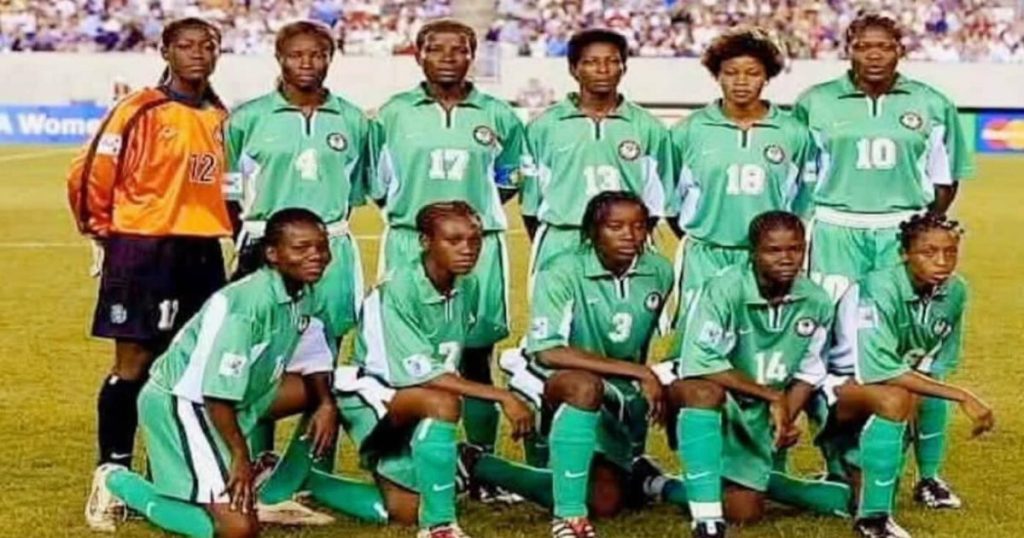The recent recognition and rewards bestowed upon the Nigerian women’s national football team, the Super Falcons, by President Bola Ahmed Tinubu and Chairman of the National Sports Commission, Mallam Shehu Dikko, have ignited a spark of hope and gratitude among former generations of the team. This renewed commitment to appreciating the contributions of women footballers has resonated deeply with former players, who have long awaited such acknowledgement for their sacrifices and achievements. The accolades, including millions of naira, land, and national honors, followed the Falcons’ triumphant victory at the Women’s Africa Cup of Nations (WAFCON) in Morocco, marking a significant shift in the government’s approach to recognizing the achievements of female athletes.
Former Super Falcons captain, Kikelomo Ajayi, along with other prominent players like Prisca Emeafu and Patience Avre-Odeli, expressed their elation during an online meeting with ex-Falcons members. They commended President Tinubu’s gesture, emphasizing its inspirational impact on aspiring female footballers across the nation. Ajayi highlighted the potential benefits of this initiative, emphasizing that recognizing and rewarding athletic excellence will encourage greater participation and elevate the overall standard of women’s football in Nigeria. However, while celebrating the current team’s success, the former players also appealed for similar recognition to be extended to past generations of Super Falcons who paved the way for today’s victories. Their contributions, they argue, laid the foundation for the current success and deserve equivalent appreciation.
Patience Avre-Odeli, speaking from the United States, specifically lauded Mallam Dikko’s role in advising the presidency on sports development. She referenced Dikko’s comments at a youth event in Abuja, where he highlighted the recommendations made to President Tinubu for honoring past Super Falcons players. Avre-Odeli interpreted these comments as a sign of a “new dawn” for Nigerian sports, signaling a more inclusive and appreciative approach towards all athletes, regardless of generation. This renewed focus on recognizing past contributions fosters a sense of continuity and respect for the history of Nigerian women’s football.
Prisca Emeafu, a former vice-captain of the Super Falcons currently residing in Ireland, expressed a bittersweet sentiment, acknowledging the progress while lamenting the lack of similar support during her playing career. She recalled the stark contrast between the current team’s reception and the experiences of her generation, who often went unrewarded despite their significant achievements, including winning the African Women’s Championship, the precursor to WAFCON. Emeafu’s personal story underscores the challenges faced by former players, revealing the financial and physical burdens they endured without adequate support.
Emeafu’s account of requiring $40,000 for surgery to treat a knee injury sustained while in the Super Falcons camp, coupled with the lack of financial assistance from the government, the Nigerian Football Federation (NFF), or the sports ministry, paints a stark picture of past neglect. She further recounted a traumatic incident where armed robbers attacked the Falcons camp, resulting in a severe leg dislocation. Despite the physical and emotional toll of this experience, Emeafu received no official recognition or support. Her story, and those of her colleagues, highlights the precarious position of many former athletes who dedicated their lives to representing Nigeria but were left to contend with injuries and financial hardship without adequate support systems.
Martha Tarhemba, another former Super Falcons star based in the United States, echoed the sentiments of gratitude towards President Tinubu and First Lady Senator Oluremi Tinubu. While appreciating their generous gesture towards the current team, Tarhemba also appealed for urgent medical support for former players facing health challenges. Her plea underscores the ongoing need for comprehensive support systems that address the long-term well-being of athletes, even after their playing careers have ended. The call for medical assistance reflects the physical toll that a demanding career in professional sports can take, and the importance of providing adequate healthcare for former athletes.
The collective voices of these former Super Falcons stars represent a powerful testament to the importance of recognizing and valuing the contributions of athletes, both past and present. Their expressions of gratitude are intertwined with appeals for a more comprehensive and equitable approach to supporting athletes throughout their careers and beyond. The recent recognition of the current Super Falcons team is a significant step in the right direction, but the stories of former players highlight the need for continued efforts to ensure that all athletes receive the support and recognition they deserve. This includes not only financial rewards but also critical support for medical care, addressing past injustices, and acknowledging the foundational role played by previous generations in building the success of Nigerian women’s football.


